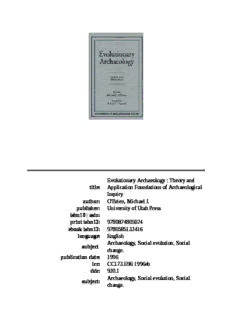Table Of ContentEvolutionary Archaeology : Theory and
title: Application Foundations of Archaeological
Inquiry
author: O'Brien, Michael J.
publisher: University of Utah Press
isbn10 | asin:
print isbn13: 9780874805024
ebook isbn13: 9780585133416
language: English
Archaeology, Social evolution, Social
subject
change.
publication date: 1996
lcc: CC173.E96 1996eb
ddc: 930.1
Archaeology, Social evolution, Social
subject:
change.
Page i
Evolutionary Archaeology
Page ii
Foundations of Archaeological Inquiry
Page iii
Evolutionary Archaeology
Theory and Application
Edited by Michael J. O'Brien
Foreword by Robert C. Dunnell
University Of Utah Press
Salt Lake City
Foundations Of Archaeological Inquiry
James M. Skibo, editor
Copyright 1996 by the University of Utah Press
All rights reserved
Printed on acid-free paper
Manufactured in the United States of America
01 00 99 98 97 96 6 5 4 3 2 1
LIBRARY OF CONGRESS CATALOGING-IN-PUBLICATION DATA
Evolutionary archaeology : theory and application / edited by Michael J. O'Brien; foreword by
Robert C. Dunnell.
p. cm.(Foundations of archaeological inquiry)
Includes bibliographical references and index.
ISBN 0-87480-5 14-7 (alk. paper)
1. Archaeology. 2. Social evolution. 3. Social change.
I. O'Brien, Michael J. (Michael John), 1950 . II. Series.
CC173.E96 1996
930.1dc20 96-20648
Page v
CONTENTS
Foreword vii
Preface and Acknowledgments xiii
Evolutionary Archaeology: An Introduction 1
Part I: The Foundations of Evolutionary Archaeology 17
1. Natural Selection, Scale, and Cultural Evolution: Some 24
Preliminary Considerations
Robert C. Dunnell
2. Evolutionary Theory and Archaeology 30
Robert C. Dunnell
3. Science, Social Science, and Common Sense: The 68
Agonizing Dilemma of Modern Archaeology
Robert C. Dunnell
4. Aspects of the Application of Evolutionary Theory in 86
Archaeology
Robert C. Dunnell
5. Archaeology and Evolutionary Science 98
Robert C. Dunnell
Part II: Methodological Issues In Evolutionary 107
Archaeology
6. Style And Function: A Fundamental Dichotomy 112
Robert C. Dunnell
7. Archaeological Potential of Anthropological and 123
Scientific Models of Function
Robert C. Dunnell
8. Elements of an Inclusive Evolutionary Model for 139
Archaeology
Robert D. Leonard And George T. Jones
Page vi
9. Undirected Variation and the Darwinian Explanation of 152
Cultural Change
David Rindos
10. Variation, Selection, and the Archaeological Record 177
Michael J. O'brien And Thomas D. Holland
Part III: Applying an Evolutionary Perspective 201
11. Symbiosis, Instability, and the Origins and Spread of 209
Agriculture: A New Model
David Rindos
12. A Paradigmatic Shift in the Search for the Origin of 236
Agriculture
Michael J. O'Brien And H. Clyde Wilson
13. Ceramics and Evolution 244
Hector Neff
14. Coevolution of Sedentism, Pottery Technology, and 270
Horticulture in the Central Midwest, 200 B.C.-A.D. 600
David P. Braun
References 285
Index 319
Contributors 329
Page vii
FOREWORD
In some respects a collection of archaeological essays using
evolutionary theory as a theme is a strange assemblage. After all,
evolutionary theory is the scientific theory used to explain living
things, and no one doubts the human authorship of the archaeological
record. It has been more than half a century since there was any
serious competition. Further, evolution is, in one version or another,
the only scientific theory that explains change in living things;
archaeology has had scientific aspirations for over a century and a
half, and the explanation of change has been a central objective in all
modern incarnations. That evolutionary theory represents only a
minor theme in a plethora of interpretive algorithms current in
archaeology todaya condition that certainly justifies a collection such
as thisis thus both anachronistic and a contradiction of the discipline's
own historic goals.
Marion Blute and I pointed out independently over fifteen years ago
that the use of scientific evolution in social science is really quite
recent, beginning well after the centenary of Darwin's On the Origin
of Species. We both concluded that this situation was largely
attributable to a confusion between scientific evolution, the modern
derivative of Darwin's insight, and what is commonly called cultural
evolution, an interpretive algorithm of considerable antiquity in
Western thought (that is, a folk explanation). As an explicit theory,
however, it is closely associated with the work of Herbert Spencer,
Edward B. Tylor, and others (for example, Karl Marx and Lewis
Henry Morgan). While social scientists were quick to overlook the
differences between Darwinian and cultural evolution in an attempt to
be construed in the Darwinian, or scientific, mold, the reverse was not
true.
Architects of modern cultural evolution in anthropology (for example,
White) appreciated the differences between the two evolutions. As
Robert Wenke and I pointed out, however, the typical worker
conflates the two thoroughly. For example, Norman Yoffee, in a
classic paper, "The Decline and Rise of Mesopotamian Civilization,"
lists a series of reasons why "evolution" as used in biology cannot be
applied in archaeology. Yet all of his reasons are also cited by
scientific evolutionists to demonstrate why cultural evolution is
defective! Scientific evolution is condemned for properties it does not
have.
There is more to it than sloppy terminology. Why such confusion
should persist is worth an essay in its own right, but it is sufficient in
this context to point out that two features probably account for much
of the confusion. In the first instance, it is difficult to find a social
scientist who has bothered to master evolutionary theorymost seem to
have taken their notion from the popular press. Others confuse it with
ecology. Key elements such as cause, materialism, selection, and
adaptation are either not understood or

